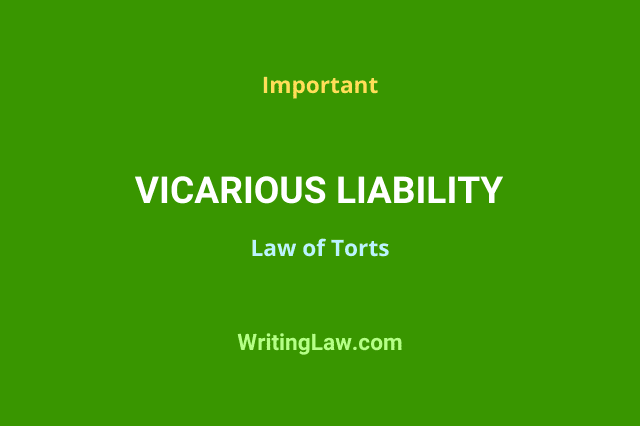
Liability Under Tort Law
A tort is a civil wrong committed against a person or property. There are certain liabilities under the tort law that make a person liable for the acts committed by another person. Now, you might be wondering how this is possible? So, in this law note, we’ll discuss the various types of liabilities under the Law of Torts and will study vicarious liability in detail.
Vicarious means acting or done for another. Thus vicarious liability in the law of torts means liability because of the actions of someone else. For example, the liability of a master because of the acts of the servant.
Kinds of Liability Under Tort Law
The two kinds of liabilities under tort law are:
Let us learn more about the kinds of liabilities under the law of torts.
1. Strict or Absolute Liability
In some torts, the defendant is liable even though the plaintiff’s harm occurred without intention or negligence on the defendant’s part. Hence, a defendant can be made liable even without fault.
Even in India, we follow the concept of absolute liability as laid down in MC Mehta vs Union of India by Justice Bhagwati.
Case Law: In the case of Rylands vs Fletcher, it was held that if a person brings or accumulates anything on his land which if escaped may cause damage to its neighbours; he does so at his liability, however careful he may have been and whatever precautions he may have taken to prevent damage. Then, he will be held liable for such an act.
We have a separate law note that tells you about strict and absolute liability. Have a look. Below, let us learn about vicarious liability.
2. Vicarious Liability
Vicarious liability is a liability where the master is liable for the tort of his servant, principal for his agent, partner for another partner and an employer for an employee.
The legal maxim Qui Facit per alium Facit per se also applies to the concept of vicarious liability, which means he who acts for another, acts for himself.
Four important kinds of vicarious liability are:
Principal-Agent Relationship
An agent is a person who acts on behalf of the principal. Therefore, if an agent does any wrongful act in the course of his employment, then the master will be held liable for the acts committed by the agent.
Suppose the agent performs some activity in the absence of the principal, which favours the principal, even though the principal does not know this act. In that case, he will still be held responsible as the agent acted for the principal’s benefit.
Partners
All the partners are liable to the same extent as the guilty partner. In Hamlyn vs Houston, one of the two partners bribed the plaintiff’s clerk, persuading him to provide confidential information about his employer’s firm. The court decided that both partners were responsible for the tort committed by only one of them.
Master and Servant
Master will be held liable for the tort or wrongful act committed by his servant during the course of employment. Obviously, the servant will also be held liable.
A master is liable not only for the acts that the servant has committed but also for the acts done by him that are not explicitly authorised.
Principal of Respondent Superior will be applicable here, which says, let the principal be liable.
The master is liable even though the servant acted against the expressed instructions.
Employer and Independent Contractor
Ordinarily, an employer is not liable for the tort committed by an independent contractor. But there are certain conditions where even the employer will be held liable.
- The employer is liable only if he has committed a tort.
- When the employer authorises him to commit a tort.
- In torts of strict liability.
- Negligence of an independent contractor.
Vicarious Liability of State
Even the state has certain liabilities, and now let us study the position of vicarious liability in India and England.
Position in England
At common law, a crown could not be sued in tort, but as per the Crown Proceedings Act, 1947, even the crown is liable for the torts committed by its servants.
Position in India
In India, the state can be held liable under vicarious liability, and it could claim immunity only if the act committed is a sovereign function.
Conclusion
By reading this law note, we can conclude that vicarious liability is a liability put on the principal for the act of his agent in the course of employment because an agent is a person who works on behalf of the principal.
Read Next:
1. What Is Rule of Constructive Liability or Joint Liability in IPC
2. What Are the General Defences Under the Law of Torts
3. What Is Nuisance in Law of Torts in India?
- 13 Characteristics of a Company Under the Companies Act - 5th March 2024
- Lee vs Lee’s Air Farming Ltd – Case Explained - 5th March 2024
- Relevant Facts Under the Indian Evidence Act - 14th January 2024







